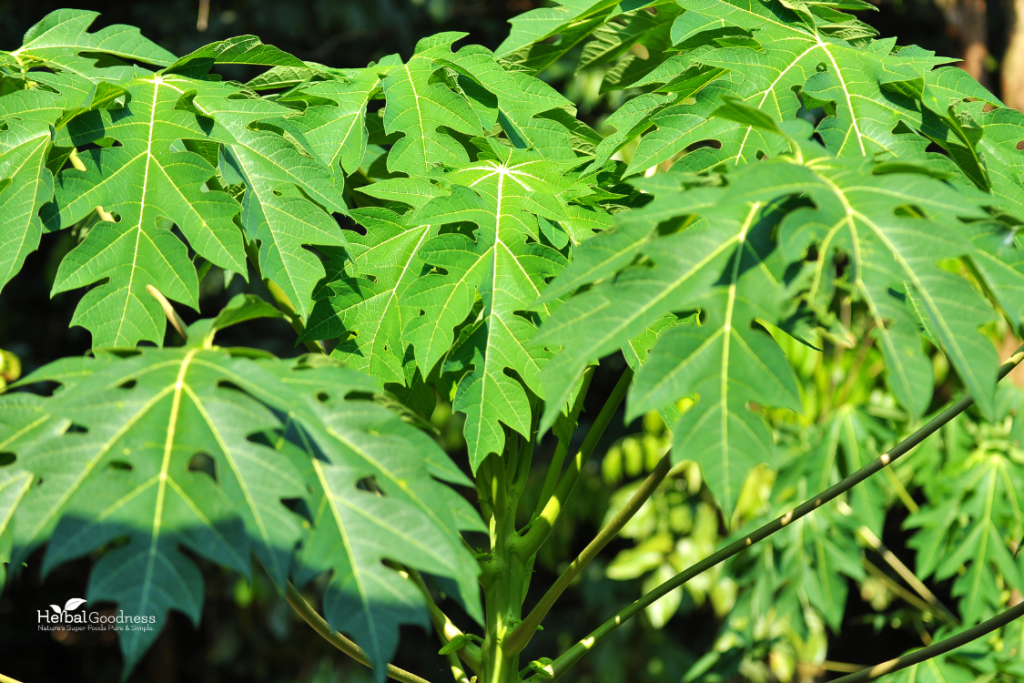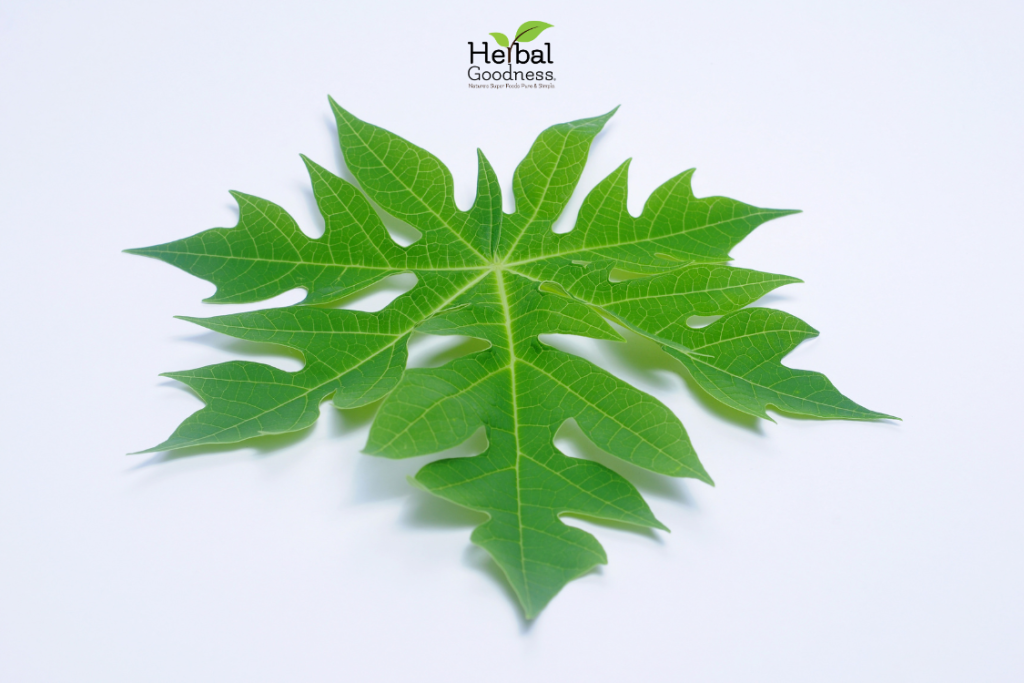
Papaya leaf is a natural remedy that has been used for centuries in various parts of the world. It is rich in antioxidants, enzymes, vitamins, and minerals that can help support your health and immunity. In this article, we will explore everything you need to know about papaya leaf. Its health benefits and medicinal properties, its history, interesting facts, how to incorporate it into your daily routine, and possible side effects.
What are Papaya Leaves?
It is the green, oval-shaped leaf of the papaya plant, also known as Carica papaya. The papaya plant is a tropical fruit tree that belongs to the family Caricaceae. It is native to Central America and Southern Mexico, but it is now cultivated in many tropical and subtropical regions around the world. Its fruit is well-known for its sweet and juicy flesh, but the leaf is equally edible and has many health benefits.
What are the Health Benefits of Papaya Leaf?
These leaves have been used for various health purposes, such as:
Boosting immunity:
They contain a high amount of vitamin C, which is essential for the immune system. It also has anti-inflammatory and antibacterial properties that can help fight infections and inflammation. Studies have shown that they can help increase the production of white blood cells and platelets, which are important for immunity and blood clotting.
Improving digestion:
Papaya leaf contains papain, a powerful enzyme that can break down proteins and fats, and aid digestion. Papain can also help relieve symptoms of indigestion, such as bloating, gas, constipation, and ulcers. It also has a soothing effect on the stomach and intestines and can help balance the pH levels, preventing acid reflux.
Supporting liver health:
Papaya leaves can help detoxify and protect the liver from damage caused by toxins. They can also help stimulate the production of bile, which is necessary for fat digestion and absorption. Studies have shown that papaya leaves can help reduce liver inflammation and fibrosis and improve liver function.
Enhancing skin health:
Papaya leaf can help improve the appearance and health of the skin, thanks to its antioxidant, and anti-inflammatory properties. It may help prevent and treat skin infections, such as acne, eczema, and fungal infections. Papaya leaves can also help reduce the signs of aging, such as wrinkles, sagging, and pigmentation. It helps stimulate collagen production, protecting the skin from free radical damage.
Promoting hair growth:
Papaya leaf can help nourish and strengthen the hair follicles and prevent hair loss and thinning. It can help improve the texture and shine of the hair, and prevent dandruff and scalp infections. Papaya leaf can also help darken the hair and prevent premature graying, by providing natural pigments and antioxidants.

What is the History of Papaya Leaf?
Papaya leaf has a long and rich history of use in various cultures and traditions. Some of the historical facts about these leaves are:
- The papaya plant was first discovered by Christopher Columbus in the Caribbean islands. He called it the “fruit of the angels” because of its delicious taste and health benefits.
- The papaya plant was later introduced to other parts of the world by Spanish and Portuguese explorers. It became widely cultivated in tropical and subtropical regions, such as Africa, Asia, and Australia.
- The papaya leaf was used by the indigenous people of Central and South America for various medicinal purposes like treating wounds, infections, digestive problems, and fever.
- The leaf was also used by the ancient Egyptians, Greeks, and Romans for cosmetic purposes. They used it for improving skin and hair quality and removing warts and moles.
- The papaya leaves were also used by the Ayurvedic, Chinese, and Thai systems of medicine for various health conditions.
How to Incorporate Papaya Leaf into Your Daily Routine?
These amazing leaves can be consumed in various forms, such as:
- Juice: this is made by crushing or blending fresh or dried papaya leaves and straining the liquid.
- Tea is made by steeping fresh or dried papaya leaves in hot water for a few minutes, and adding sugar or honey if desired.
- Extract: its leaf extract is a concentrated form and can be taken as a supplement. It is usually available in capsules, tablets, or liquid form, and can provide a higher dose of the active compounds in papaya leaf.
- Papaya leaf powder: is a dried and ground form of papaya leaf that can be used as a spice or a supplement.
- Oil: this is an essential oil that is extracted from the papaya leaf by steam distillation or cold pressing. It has a green and fruity scent, and it can be used for aromatherapy, massage, or skincare.
What are the Possible Side Effects of Papaya Leaf?
Papaya leaves is generally safe and well-tolerated by most people, but it may cause some side effects or interactions in some cases, such as:
- Allergic reactions: Some people may be allergic to papaya leaf or its components. They may experience symptoms such as itching, rash, swelling, or difficulty breathing. If you have a history of allergies, especially to latex, you should avoid papaya leaves or consult your doctor before using it.
- Pregnancy and breastfeeding: Papaya leaf may have uterine stimulant and abortifacient effects, and it may cause miscarriage, premature labor, or birth defects. Therefore, pregnant and breastfeeding women should avoid it or consult their doctor before using it.
- Blood thinners: Papaya leaf may have anticoagulant and antiplatelet effects, and it may increase the risk of bleeding or bruising. Therefore, people who are taking blood thinners, should avoid it or consult their doctor before using it.
- Blood sugar levels: Papaya leaf may lower blood sugar levels and improve insulin sensitivity, and it may interfere with the effects of diabetes medications, such as metformin, insulin, or sulfonylureas. Therefore, people who have diabetes or hypoglycemia should monitor their blood sugar levels closely and adjust their medication dosage accordingly, or consult their doctor before using papaya leaf.
- Hormonal balance: Papaya leaf may have estrogenic and anti-estrogenic effects, and it may affect the hormonal balance and the menstrual cycle in women. It may also interact with hormone replacement therapy or birth control pills, and alter their effectiveness. Therefore, women who have hormonal disorders, such as endometriosis, fibroids, or breast cancer, or who are using hormonal medications, should avoid papaya leaves or consult their doctor before using them.
Conclusion
Papaya leaf is a natural remedy that can boost your health and immunity in various ways. Its antioxidant, and anti-inflammatory properties can help support your digestion, liver, skin, hair, and blood health. Papaya leaves may also have some side effects or interactions, and should be used with caution and under medical supervision, especially by pregnant and breastfeeding women, people who have allergies, blood disorders, diabetes, or hormonal disorders, or people who are taking blood thinners, diabetes medications, or hormonal medications. Papaya leaves can be consumed in various forms and can be incorporated into your daily routine for optimal health and wellness.


